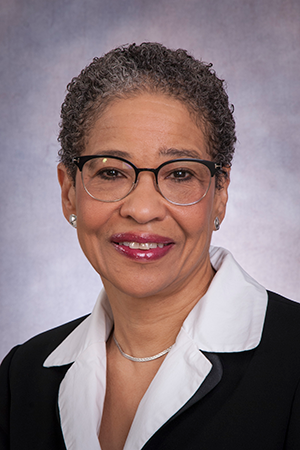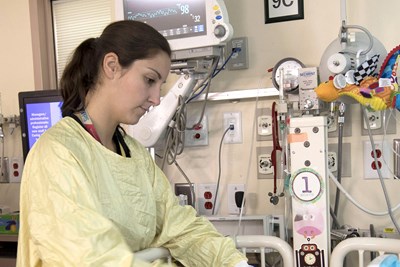
Estelle B. Gauda
Research Positions
Senior Scientist
Translational Medicine
Biography
Dr. Gauda is board-certified in Paediatrics and Perinatal-Neonatal Medicine. She joined SickKids in March 2017 as Head of the Division of Neonatology, a position she held until 2024. She is currently the Women’s Auxiliary Chair of Neonatology and Senior Associate Scientist in the SickKids Research Institute. She is Head of the Division of Neonatology and a Professor of Paediatrics at the University of Toronto as well as Director of the Toronto Centre for Neonatal Health.
Dr. Gauda has clinical expertise in Perinatal-Neonatal care of the high risk newborn and a solid research portfolio in babies and preclinical models investigating 1) mechanisms that control breathing with a focus on maturation of the carotid body and its effects on breathing during development in health and disease, 2) novel therapeutic targets for the treatment and prevention of acute and chronic lung disease in premature infants, and 2) the use of clonidine for the treatment of neonatal abstinence syndrome.
Dr. Gauda has a passion for mentoring and teaching and has lead federally funded programs to increase the pipeline of underrepresented minorities in biomedical research and clinical medicine. She has lead faculty professional development programs that support careers in academic medicine with work/life integration and satisfaction.
Research
Dr. Gauda is a physician-scientist with clinical expertise in Perinatal-Neonatal care of the high risk newborn and has a solid research portfolio investigating mechanisms that control breathing with a focus on maturation of the carotid body and its effects on breathing during development in health and disease in premature infants. She has extensive research experience in using animal models. Her latest area of research is to investigate novel biological mechanisms that might be used as new therapeutic target to prevent the development of lung injury in premature babies.
Education
Degrees
- 1980–1982: MD, University of Iowa, College of Medicine, Iowa City, Iowa, United States
- 1976–1980: 6-year Medical School, University of Missouri, Kansas City, Missouri, United States
Postgraduate, Research and Specialty Training
- 1985–1988: Post-Doctoral Fellow, Perinatal-Neonatal, Rainbow Babies’ and Children’s Hospital Case Western Reserve University, Cleveland, Ohio, United States
- 1982–1985: Resident, Pediatrics, St. Louis Children’s Hospital, Washington University, St Louis, Missouri, United States
Experience
Hospital
- 2017–2024: Head, Division of Neonatology, The Hospital for Sick Children, Toronto, Ontario, Canada
- 1999–2007: Director, Center for Neonatal Transitional Care, Mount Washington Pediatric Hospital, Baltimore, Maryland, United States
- 1988–2017: Staff Neonatologist, Johns Hopkins Children’s Hospital, Baltimore, Maryland, United States
- 1988–2017: Staff Neonatologist, Bayview Medical Center, Johns Hopkins Medical System, Baltimore, Maryland, United States
Research
- 1994–1996: Guest Researcher, NIMH, Laboratory of Cell Biology, Bethesda, Maryland, United States
University
- 2014–2017: Senior Associate Dean for Faculty Development, John Hopkins Children’s Centre, Johns Hopkins University, Baltimore, Maryland, United States
- 2008–2020: Professor of Pediatrics, John Hopkins University School of Medicine, Baltimore, Maryland, United States
- 2006–2014: Chair, Associate Professor Promotions Committee, Johns Hopkins University, Baltimore, Maryland, United States
- 1998–2008: Associate Professor, Department of Pediatrics, Johns Hopkins University, Baltimore, Maryland, United States
- 1993–2000: Director, Perinatal-Neonatal Fellowship Program, Johns Hopkins Children’s Center, Johns Hopkins University, Baltimore, Maryland, United States
- 1989–1998: Assistant Professor, Department of Pediatrics, Johns Hopkins Children’s Centre, Johns Hopkins University, Baltimore, Maryland, United States
- 1988–1989: Instructor, Department of Pediatrics, Johns Hopkins University School of Medicine, Baltimore, Maryland, United States
Achievements
- 2017–Present: Elected Member, Observational Safety Monitoring Board. National Heart, Lung and Blood Institute (NHLBI), Prevent Study
- 2014–2018: President, International Society for Arterial Chemoreceptors
Publications
- Gauda EB, McLemore GL. (2020). Premature birth, homeostatic plasticity and respiratory consequences of inflammation. Respiratory Physiology and Neurobiology. 274: 103337.
- Kang NY, Ivanovska J, Tamir-Hostovsky L, Belik J, Gauda EB. (2018). Chronic Intermittent Hypoxia in Premature Infants: The Link Between Low Fat Stores, Adiponectin Receptor Signaling and Lung Injury. Advances in Experimental Medicine and Biology. 1071: 151-157.
- Gauda EB, Master Z. (2018). Contribution of relative leptin and adiponectin deficiencies in premature infants to chronic intermittent hypoxia: Exploring a new hypothesis. Respiratory Physiology and Neurobiology. 256: 119-127.
- Master ZR, Porzionato A, Kesavan K, Mason A, Chavez-Valdez R, Shirahata M, Gauda EB. (2016). Lipopolysaccharide exposure during the early postnatal period adversely affects the structure and function of the developing rat carotid body. Journal of Applied Physiology. 121(3): 816-827.
- Chavez-Valdez R, Ahlawat R, Wills-Karp M, Gauda EB. (2016). Mechanisms of modulation of cytokine release by human cord blood monocytes exposed to high concentrations of caffeine. Pediatric Research. 80(1): 101-109.
Relevant pages
Toronto Centre for Neonatal Health
The Toronto Centre for Neonatal Health (TCNH) is a collective of healthcare professionals and experts striving to provide the best outcomes possible for newborns and families through Community, Advocacy, Research and Education (CARE).

We provide the highest level of care to medically complex and surgical neonates.

